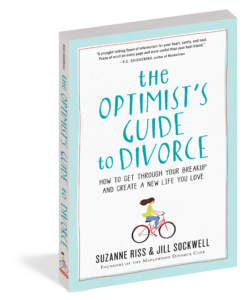By Jill Sockwell, co-author of The Optimist’s Guide to Divorce.
When you find out a good friend is going through something as challenging as divorce, the last thing you want to do is make a friend feel even worse by saying or doing the wrong thing. Having navigated our own separations and divorces, Suzanne Riss and I developed strategies for showing up solo to events, and deflating the pink elephant in the room with our ex’s face on it. In fact, we learned quite a bit firsthand about what works best when it comes to supporting a good friend whose world has been turned upside down. Follow our tips below the next time you are feeling tongue-tied around a newly separated friend.

What Not to Say
Did you hear who your ex is dating?
You remember the old expression, “Don’t shoot the messenger?” Likely the last thing your friend wants is to be blindsided with news about a new romance her ex and someone she knows have embarked upon. She will find out soon enough. Share love and goodwill with her, not gossip.
I know how you feel.
If you haven’t been divorced, don’t say this. Simply put, it will ring hollow to your friend as she may think you are comparing her divorce to your bad break up with your old college boyfriend—not quite the same thing.
I never liked him anyway.
Don’t say this, even if she is complaining about him and you think it will temporarily make her feel better and like you’re “on her side.” If she gets back together with her husband, she may not forgive you for speaking ill of him, and it will be forever awkward. Offer empathy to her, not criticism of her spouse.
What to Say
Let me know what day I can bring over dinner—Tuesday or Thursday?
Offering to bring your friend dinner, help with the kids, or even just get together and talk, and attaching a day to it, lets her know it’s not an empty promise, and that you fully intend to support her by showing up for her. This is much more powerful than a watered-down, “I’d love to help you out sometime.”
I am here for you—everyone goes through hard times, and I know you would be there for me.
If your friend is feeling isolated, or even hesitant to ask for help so as not to appear “needy,” this phrase is great because it’s an equalizing statement. When your friend thinks, “Yeah, I would be there for her, too” she is more likely to accept help, compassion, and support from you during her divorce when she needs it.
How are you?
Call. Chat. Repeat. Whether your friend answers the phone every time you call isn’t even the point. It’s in the act of calling to check on her—you are showing her that she is important to you. Somedays she might want to talk, others not at all. Calling her lets her know that she has a support network she can count on.
For more from Jill Sockwell on healthily navigating a divorce, check out her book below.
 About the Book:
About the Book:
For the more than one million women who get divorced each year, welcome to your support group.
Wise, comforting, and uplifting, The Optimist’s Guide to Divorcecaptures the experience of sisterhood through the voices of its authors and their community of women in the Maplewood Divorce Club—women who understand what you’re going through, who know the practical issues as well as the emotional ones, and who can help you keep a sense of hope and a sense of humor.
Brimming with stories and insights, valuable resources and smart strategies, in-the-trenches tips and sanity-saving takeaways, this book prepares you for each phase of divorce, from having “the talk,” to breaking the news to family and friends, to figuring out where to live, to co-parenting with an ex, to rebounding and rebooting your life. It’s divided into three sections that cover the process from start to finish—Deal, Heal, and Reveal—and make it easy to jump in wherever you are in your journey. And even better, to make the choices that will help you develop a better relationship with the one person you’ll be with for the rest of your life—yourself.
Buy the Book
Amazon | B&N | Indiebound | Workman





No Comments